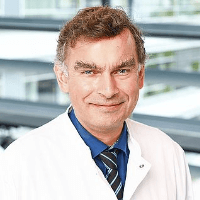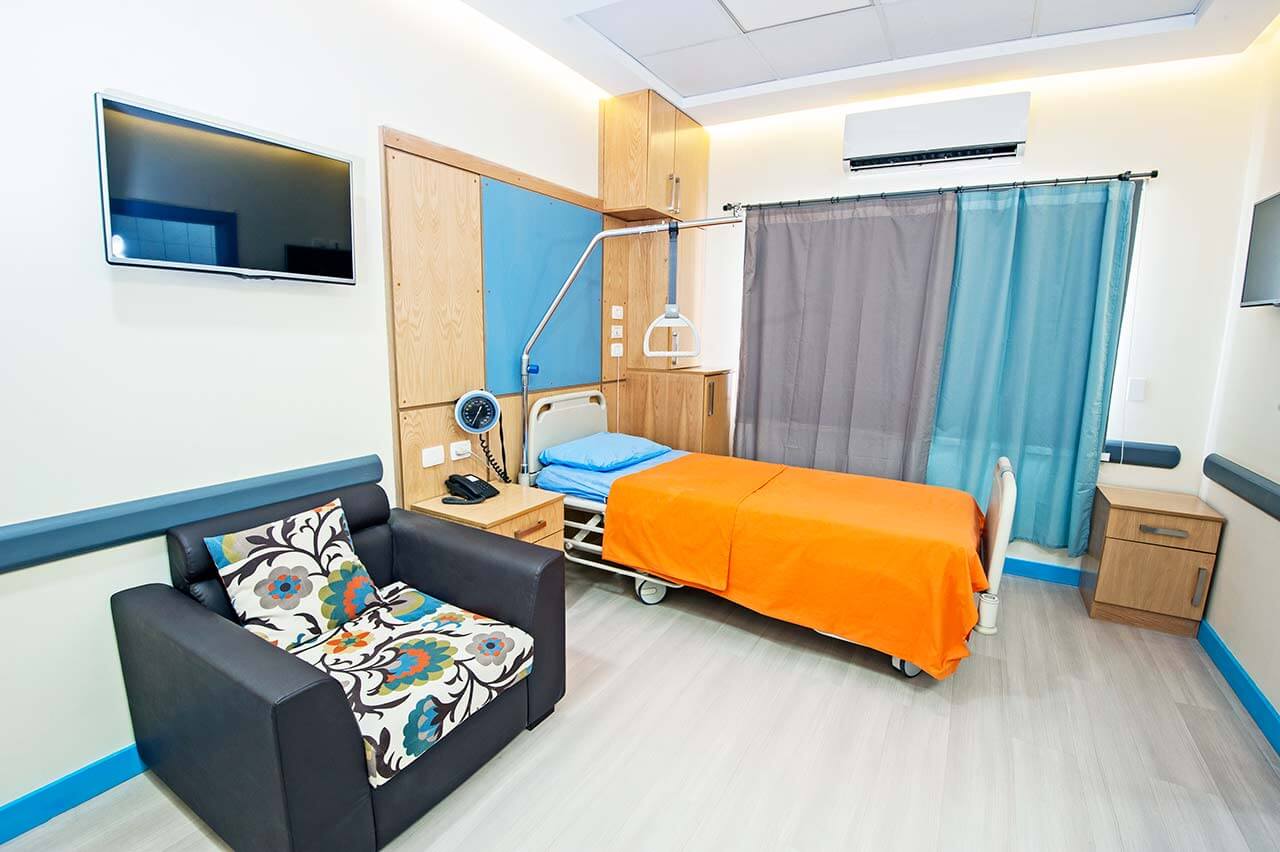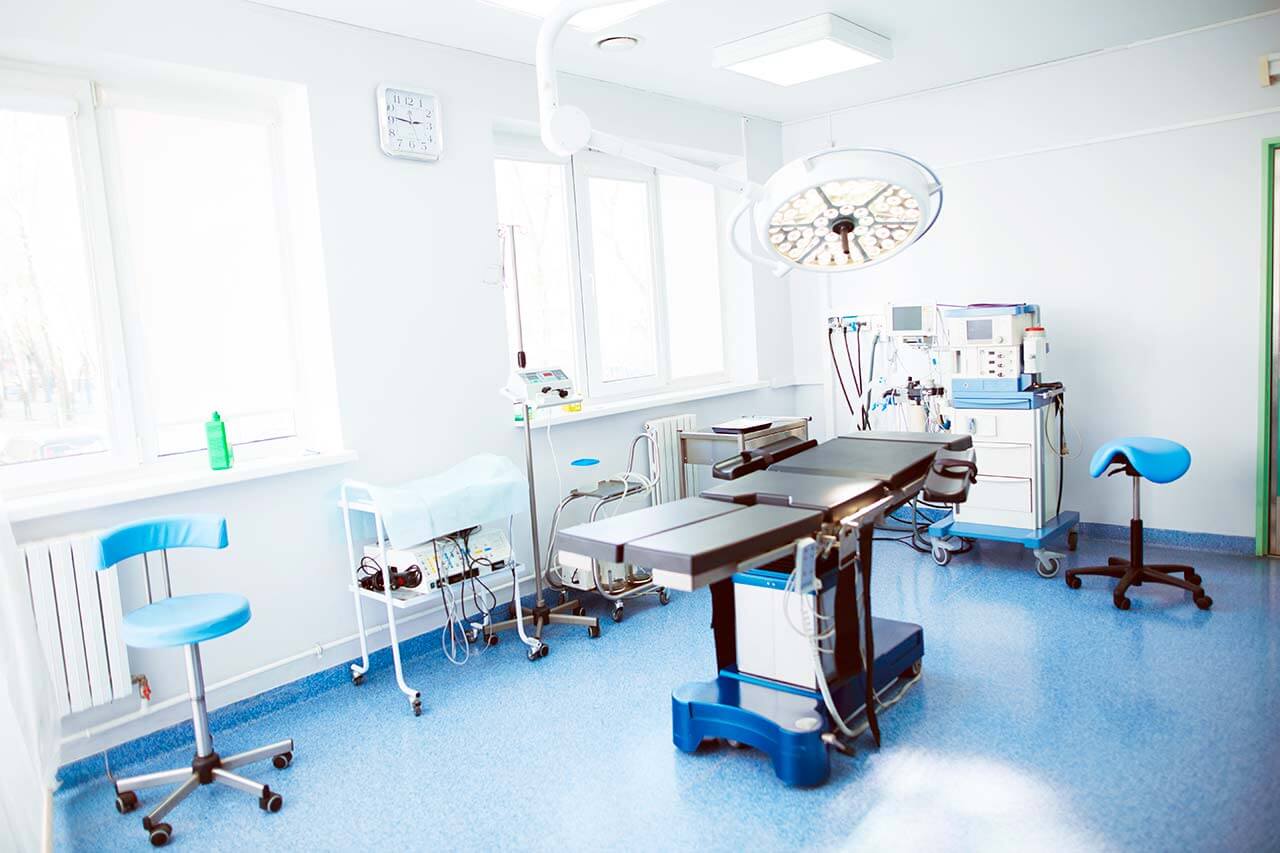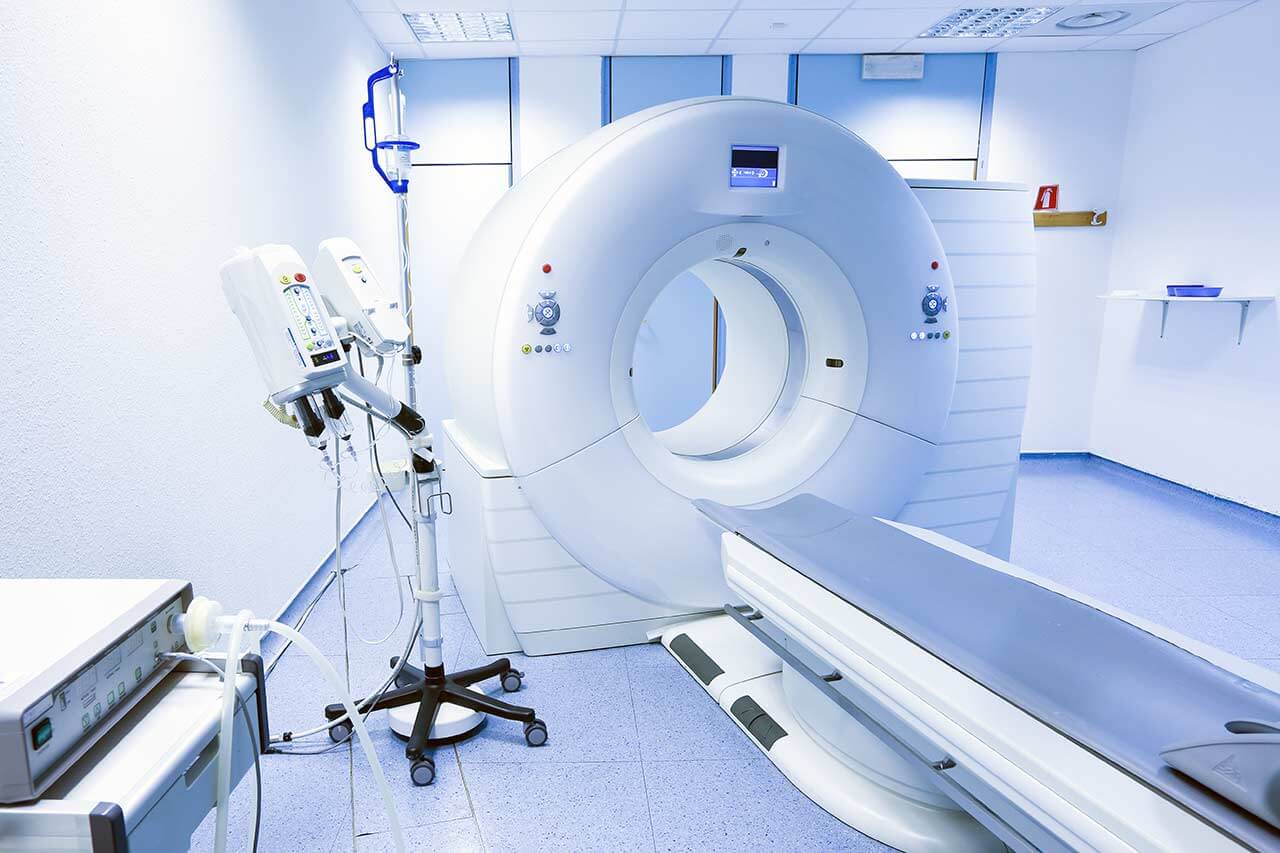
The program includes:
- Initial presentation in the clinic
- clinical history taking
(widespread pain for more than three months) - review of medical records
- physical examination
- laboratory tests:
- complete blood count
- general urine analysis
- biochemical analysis of blood
- TSH-basal, fT3, fT4
- immune status
- inflammation indicators (CRP, ESR)
- indicators blood coagulation
- differential diagnosis with other etiologies pain
- pain points testing
- consultation of related specialists
- symptomatic specific treatment
- the cost of essential medicines and materials
- nursing services
- control examinations
- full hospital accommodation
- developing of further guidance
Required documents
- Medical records
Service
You may also book:
 BookingHealth Price from:
BookingHealth Price from:
About the department
The Department of Nephrology, Rheumatology and Pulmonology at the Municipal Hospital Karlsruhe provides the widest range of services for the prevention, diagnostics and treatment of kidney diseases, arterial hypertension, inflammatory diseases of the joints and blood vessels, diseases of the lungs, bronchi and upper respiratory tract. To provide inpatient treatment, the department has 77 beds for general care, as well as 19 beds in the Intensive Care Unit. The department also includes a Dialysis Unit with 17 places, in which doctors carry out various types of renal replacement therapy. The department operates specialized outpatient clinics, within which doctors hold consultations for the patients with kidney diseases and arterial hypertension, rheumatic pathologies, lung diseases and conditions after kidney transplant surgery. In general, about 2,500 inpatients and more than 1,800 outpatients are treated in the department annually. The health of the patients is in safe hands of a highly qualified team of doctors with rich practical experience and deep theoretical knowledge. The Head Physician of the department is Prof. Dr. med. Martin Hausberg.
One of the priority focuses of the department's work is the conduction of various types of dialysis for kidney diseases. Dialysis procedures are carried out in a specially equipped room with 17 beds. The department's specialists perform about 11,500 hemodialysis procedures on an inpatient and semi-inpatient basis. The service range is complemented by ultrafiltration, hemofiltration and hemodiafiltration procedures. The tasks of the specialists also include the performance of continuous veno-venous hemodialysis and continuous veno-venous hemodiafiltration. With special indications, plasmapheresis or immunoadsorption techniques can be used as well (for example, for autoimmune diseases). The department is one of the best in the region in the field of dialysis procedures and has gained a reputation as a supraregional Peritoneal Dialysis Center. In addition, the department's doctors deal with the treatment of arterial hypertension of any severity (primary and secondary forms), which can lead to severe lesions of the kidneys and other vital organs. In the case of arterial hypertension, the department's doctors usually resort to drug therapy with lifestyle modifications.
An equally important area of clinical practice is rheumatology. The experts of this profile provide qualified medical care to the patients with inflammatory joint diseases (arthritis), systemic diseases (vasculitis) and connective tissue diseases (collagenosis). Doctors have a unique experience in the treatment of inflammatory rheumatic diseases with kidney lesions. Rheumatic pathologies can be detected with various diagnostic methods, in particular, diagnostic joint punctures with a synovial fluid analysis, arthrosonography (joint ultrasound scanning) and color-coded duplex ultrasonography of the blood vessels, as well as the latest imaging tests (PET, MRI, and CT). The treatment is mostly based on the intake of various modern medicines, which are individually prescribed by the patient's attending physician.
The department's pulmonologists specialize in the treatment of pneumonia, chronic inflammatory diseases of the respiratory tract (bronchial asthma, chronic bronchitis, and chronic obstructive pulmonary disease), pulmonary emphysema, bronchiectasis, interstitial lung diseases, pulmonary hypertension, pulmonary embolism, lung cancer, pleural effusion, and occupational pulmonary diseases. The specialists use many high-precision examinations to diagnose pulmonary diseases, including imaging, bronchoscopy, and thoracoscopy. The department also specializes in invasive and non-invasive artificial ventilation. The service range is complemented by comprehensive diagnostics of sleep-related breathing disorders (follow-up treatment in cooperation with the Department of Otolaryngology). As for the treatment, the specialists most often manage to eliminate pulmonary diseases with the help of well-chosen drug therapies. If the intake of medications does not allow achieving the desired result, low-traumatic interventional (bronchoscopic) procedures can be performed then: for example, to eliminate stenosis in the airways caused by benign and malignant neoplasms, stop bleeding in the airways, remove foreign bodies from the airways, etc.
The department's range of medical services includes:
- Diagnostics and treatment of kidney diseases
- Diagnostics
- Laboratory tests
- Ultrasound examinations, including color-coded duplex ultrasonography
- Ultrasound-guided kidney biopsy
- Diagnostics
- Treatment
- Drug therapy
- Renal replacement therapy, including dialysis access formation
- Hemodialysis
- Ultrafiltration
- Hemofiltration
- Hemodiafiltration
- Continuous veno-venous hemodialysis
- Continuous veno-venous hemodiafiltration
- Plasmapheresis
- Immunoadsorption
- Diagnostics and treatment of arterial hypertension
- Diagnostics
- Blood pressure measurement, including 24-hour monitoring
- Electrocardiography
- Echocardiography
- Kidney ultrasound
- Laboratory blood tests and urinalysis
- Treatment
- Drug therapy
- Lifestyle modifications
- Psychosomatic care ("stress management")
- Diagnostics
- Diagnostics and treatment of rheumatic diseases
- Diagnostics
- Joint puncture followed by a synovial fluid analysis
- Ultrasound examinations (arthrosonography)
- Color-coded duplex ultrasonography of the blood vessels
- Imaging tests: PET, MRI, and CT scans
- Treatment
- Drug therapy
- Diagnostics
- Diagnostics and treatment of pulmonary diseases
- Diagnostics
- Pulmonary function tests
- Blood gas analysis at rest and during exercises
- Spirometry
- Whole body plethysmography
- Lung diffusion capacity measurement
- Spiroergometry
- Non-specific provocation tests
- Measurement of fractional exhaled nitric oxide (FeNO)
- 6 minute walk test
- Ultrasound examinations, including ultrasound-guided interventions on the chest organs
- Heart ultrasound (echocardiography) to diagnose pulmonary hypertension
- Imaging diagnostics (in cooperation with the Department of Radiology and the Department of Nuclear Medicine)
- CT
- MRI
- X-ray
- Ventilation and perfusion scintigraphy
- PET
- Bronchoscopy
- Flexible, rigid and combined bronchoscopy
- Endobronchial ultrasound
- Biopsy: endobronchial ultrasound-guided transbronchial needle aspiration, forceps biopsy, and transbronchial lung cryobiopsy
- Pulmonary function tests
- Treatment
- Drug therapy
- Bronchoscopic interventions
- Interventional treatment of benign and malignant stenoses of the central airways (cryotherapy, stent implantation, brachytherapy, argon plasma coagulation)
- Bronchoscopic hemostasis for bleeding from the respiratory tract
- Foreign body removal
- Treatment of patients with severe pulmonary emphysema using endoscopic lung volume reduction and endobronchial valves
- Non-invasive and invasive mechanical ventilation
- Advanced forms of COPD and emphysema
- Obesity hypoventilation syndrome
- Restrictive lung diseases
- Neuromuscular diseases
- Prolonged artificial lung ventilation and weaning
- Diagnostics
- Other medical services
Curriculum vitae
Prof. Dr. med. Martin Hausberg studied Medicine in Luebeck and Montpellier. After his studies, he worked as a Research Fellow at the Institute of Physics and Anatomy of the University of Luebeck. For two years, he worked as a Visiting Research Fellow at the Cardiovascular Research Center of the University of Iowa (USA). Since 1999, Prof. Hausberg has been a certified Practitioner in Internal Medicine, and in 2001 he received his additional specialization in Nephrology. The doctor devoted his habilitation to the research of the activity of the sympathetic nervous system and the functional properties of the vascular wall at the terminal stage of kidney failure and after kidney transplantation. In 2005, he held the position of the Extraordinary Professor at the Faculty of Medicine of the University of Muenster. Since 2008, he has been heading the Department of Nephrology, Rheumatology and Pulmonology at the Municipal Hospital Karlsruhe.
Memberships in Professional Societies and Organizations
- Chairman of the German Hypertension League.
- Member of the North Baden Hypertension League.
- Member of the International Society of Hypertension.
- Hypertension Specialist of the European Society of Hypertension.
Photo of the doctor: (c) Städtische Klinikum Karlsruhe
About hospital
The Municipal Hospital Karlsruhe is a modern maximum care medical facility, which combines a long tradition and the advanced achievements of modern medicine. The hospital operates on the basis of the University of Freiburg, so scientific innovations in the field of diagnostics and treatment are continuously introduced into practice here. The hospital presents almost all areas of modern medicine, including many medical services for young patients.
A highly qualified and experienced team of more than 4,500 employees provides impeccable medical care. The medical facility has 1,571 beds for the hospitalization of its patients. The hospital admits more than 63,000 inpatients and about 186,000 outpatients annually. A large number of patients wishing to receive medical care in the hospital speak for themselves and are a confirmation of the exceptional service, as well as the effectiveness of the treatment provided.
The quality management system of the hospital's medical care is certified in accordance with the DIN EN ISO 9001 standards. Since 2016, the hospital has implemented a regular quality control in compliance with the strict standards of the Initiative Quality Medicine (IQM). In addition, almost all departments of the hospital have numerous certificates in their areas of specialization, including certificates from the German Cancer Society (DKG), the German Society for General and Visceral Surgery (DGAV), the German Cardiac Society (DGK), the German Diabetes Society (DDG), the German Society of Nephrology (DGN), the German Trauma Society (DGU), etc.
The main value of the hospital's staff is the health and satisfaction of their patients, so a respect and a humane attitude towards each patient remain priorities. The doctors and nursing staff support each patient in every possible way on their path to recovery. The specialists also strive to perform the most sparing, but at the same time the most effective and safe treatment.
Photo: (с) depositphotos
Accommodation in hospital
Patients rooms
The patients of the Municipal Hospital Karlsruhe live in cozy patient rooms with everything necessary for a comfortable stay. Standard patient room furnishing includes an automatically adjustable bed, a bedside table, a TV, and a telephone. The patient rooms have Wi-Fi. Each patient room also has an ensuite bathroom with a shower and a toilet.
The patient rooms in the pediatric departments are specially designed for children, so that young patients feel at home. Children can live in their patient room with one of their parents. There are also special playrooms designed for children.
Meals and Menus
The patients of the hospital are offered tasty and varied three meals a day: breakfast, lunch and dinner. The menu also features dietary meals. The kitchen staff will gladly accept all the individual wishes of patients.
The hospital also has a cozy cafe where one can have a tasty snack, drink tea, coffee and soft drinks.
Further details
Standard rooms include:
Religion
The hospital has two chapels that regularly host Protestant, Catholic, and Ecumenical worship services. A patient can watch the broadcast of the worship on TV channels in his own room, if desired.
Accompanying person
Your accompanying person may stay with you in your patient room or at the hotel of your choice during the inpatient program.
Hotel
You may stay at the hotel of your choice during the outpatient program. Our managers will support you for selecting the best option.





